Vol 5 No. 2 TROPIC LIGHTNING NEWS January 12, 1970
Index
Through The Woods to Charlie’s House
Triple Deuce, PFs Smash 27
By SP4 HENRY ZUKOWSKI
PB DIXON - Armormen of the 2d Battalion (Mechanized) 22d Infantry gave NVA
Regulars a deadly demonstration of Mechanized Mobility - killing 27 enemy in an
eight-hour battle three miles southeast of Trang Bang.
The Triple Deuce baptism by fire in the 3d Brigade area of operation was the
largest action fought there in months.
Men from Bravo Company along with PF Forces were sweeping a hedgerow on foot
with armored personnel carriers following behind when suddenly the PF platoon
spotted four enemy soldiers. The PFs opened fire and killed all four.
“AT FIRST CONTACT, we began to take small arms fire from fighting positions
and bunkers in the hedgerows and thick underbrush,” said Second Lieutenant Robert
Labadie of Aurora, Ohio, the second platoon leader.
Labadie began silencing the enemy bunkers with hand grenades as a stiff
volley of AK rifle fire cracked around his men.
Company commander Captain Martin Pinsky of Laphet Hill, Pa., recalled the
action. “Using the PFs as a blocking force, the APCs took the lead, setting off
numerous booby traps in the brush. They gave us overwhelming fire superiority,
forcing the enemy to stay down.”
When artillery from Battery A of the 2d Battalion, 77th Artillery at Fire
Support Base Jackson and gunships “prepped” the area, the tracks moved on line
and began assaulting the enemys’ last defenses.
“The enemy was well dug in and we had to dig him out,” said SP4 Jerry Harder
of Adair, Iowa.
A SWEEP OF THE AREA that evening, and another by the Wolfhounds of the 2d
Battalion, 27th Infantry on the following day, turned up 27 enemy dead, numerous
medical and food supplies, NVA webgear, one machinegun, one complete 60mm
mortar, 11 hand grenades, five AF-47 assault rifles, claymores, boobytraps and
mines.
Less than a mile from the contact area, other 3d Brigade soldiers located
eight 107mm rockets and four Chicom anti-personnel mines along with scattered
small arms munitions and explosives.
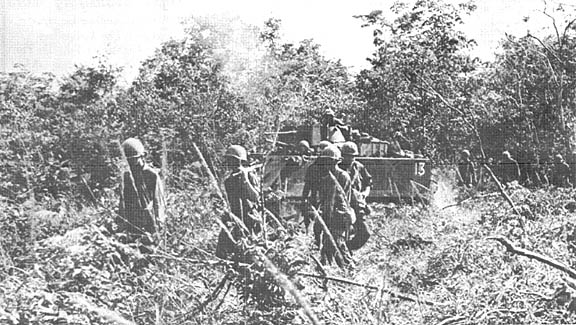 |
| Tropic Lightning soldiers of the 2d Battalion (Mechanized), 22d Infantry leave their tracks and move into a hedgerow during an operation southwest of Trang Bang. The men of Bravo Company along with Popular Forces killed 27 enemy soldiers in the eight hour battle. |
Tax Bite On 5 Foe
TRANG BANG - Vietnamese civilians living around Trang Bang won’t be worrying
too much about their tax bills these days.
The Reconnaissance platoon of Company E, 2nd Battalion, 12th Infantry, put a
stop to VC tax collecting in the area with an ambush in the vicinity of Bao Me
recently.
While operating with forces of the 3rd Squadron, 4th Cavalry and Vietnamese
RF troops, the Echo Company platoon spotted ten enemy to the front of their
ambush position.
A sweep of the area following the 30 minute clash revealed 5 enemy dead, a
Chicom pistol, AK-47 ammunition and a number of blood trails. Later it was
discovered that one of the enemy killed was a VC tax collector.
| You say you want to DEROS on time and in one piece?? Well, we say that most of the accidents caused in the division are due to carelessness around weapons. Be careful around firearms and don’t take them for granted. Treat them as though your life depended on them, because it does. DEROS. Do it the safe way. |
Manchus Grip ‘Fingers” Area
By SP4 TONY CRAWFORD
TAY NINH - The Manchus of Alfa Company, 4th Battalion, 9th Infantry, recently
went northwest of the Black Virgin Mountain to try their hand in the dense enemy
infested woods, commonly referred to as the “Fingers Area”. A great deal of
enemy activity had been reported and Alfa company’s mission was to saturate the
area with small night ambushes.
During the first two nights, enemy movement in large groups was sighted but
the ambushes were too small to be employed effectively. Because of this heavy
activity, Alfa ambushes became platoon size the following night.
About 0100 hrs, PFC William W. Yeager of Fairchance, Pa., heard noises.
“I WAS on guard when I suddenly heard movement to my left,” Yeager later
recalled. He immediately alerted the rest of his ambush and then waited for the
enemy.
In what seemed to be hours, but in reality was merely a minute or two, the
twelve enemy made their way towards, and moved in front of, the waiting Manchus.
“When they were in the center of our kill zone we detonated our claymores and
tossed a few grenades,” recalled Sgt. David Barnes of Portsmouth, Va. Then
after reconning with M-79s and more hand grenades, the platoon assaulted the
kill zone.
PFC Ramon C. Estrada of El Paso, Texas, a member of the maneuver unit,
remembered the night as being brightly lit by a full moon. “We had no trouble
spotting the dead enemy,” he said. They gathered up the four dead bodies and
captured weapons, then returned to the ambush site to wait till morning.
AT DAYBREAK they returned to the area and after rechecking, found another
dead enemy, giving them a total of five enemy KIAs, along with an AK-47, an
AK-50, a carbine, and a Chicom pistol. One of the dead was carrying valuable
documents and maps which were sent back for a readout.
PFC William Riley of Oaklahoma City commented after the ambush, “Those
claymores really do a job.” Several blood trails were found as evidence that
those who escaped were badly hit.
After returning to Tay Ninh Base Camp. Lt. Richard W. Gill praised his men.
“They did just what was expected of them; the operation couldn’t have gone
smoother.”
Stinger Gunships Kill Five
CU CHI - Stinger gunships and slicks killed 11 enemy soldiers in two morning
contacts recently in the 3d Brigade area of operations near here.
THE 116TH ASSAULT Helicopter Company gunships began finding groups of enemy
on the move shortly after sunrise. While supporting the 1st Battalion, 27th
Infantry Wolfhounds a Stinger Light Fire Team took ground fire from an enemy
position five miles east of Bao Trai. The chopper pilots returned fire with
rockets and mini-guns.
A sweep of the area by the Wolfhounds revealed six NVA soldiers killed by the
gunship firepower.
SHORTLY AFTER NOON, while inserting ARVN troops of the 46th Regiment, 116th
slicks received small arms fire from a hooch four miles west of Trang Bang.
Doorgunners returned the enemy’s fire while gunships came on station.
The slicks set down again, picked up the ARVN unit, and lifted off to insert
the ARVN troops in a blocking position. The choppers continued to receive
ground fire as the gunships fired rockets and miniguns into the area.
A sweep by the ARVNs revealed five more NVA killed.
Page 2 TROPIC LIGHTNING NEWS January 12, 1970
Decorated
| SILVER STAR | |
| SSG David M. Fanesi,
Co A, 2d Bn, 12th Inf SGT George W. Whitley, Co B, 2d Bn, 27th Inf |
SP4 Danny L.
Griffin, Co B, 2d Bn, 27th Inf PFC Duane T. Schindler, Co B, 2d Bn, 27th Inf |
| DISTINGUISHED FLYING CROSS |
|
| CPT Charles E. Dewese, HHC, 2d Bn, 27th Inf WO1 Raymond S. Cabanan, Co A, 25th Avn Bn |
WOl Thomas H. James, Co A, 25th Avn Bn |
| SOLDIER'S MEDAL |
|
| CPT Ronald S. Graves, HHC, 2d Bn, 12th Inf CPT John E. Lockner, HHC, 2d Bn, 12th Inf |
PFC Ronald Kuhn, Co C, 3d Bn, 22d Inf |
| BRONZE STAR FOR HEROISM |
|
|
CPT Ralph G. Laubecher, Co B, 1st Bn, 5th Inf 1LT George M. Norrie, B Trp, 3d Sqdn, 4th Cav 1LT Mitchell C. Meilstrup, HHC, 1st Bn, 5th Inf 1LT Joe F. Love, C Btry, 1st Bn, 8th Fld Arty 2LT John E. Markham, C Btry, 3d Bn, 13th Fld Arty 1SG Floyd English Jr., Co B, 2d Bn, 22d Inf SSG John P. Lachman, Co B, 2d Bn, 22d Inf SSG Phillip Bynum, Co B, 2d Bn, 22d In£ SSG Kenneth D. Cecil, Co F, 75th Inf SGT George A. Naftanel, Co A, 1st Bn, 27th Inf SGT Michael A. Schumaker, Co B, 1st Bn, 27th Inf SGT Herbert L. Gillispie Jr., HHC, 1st Bn, 5th Inf SP5 Lloyd L. Rassat, Co E, 1st Bn, 27th Inf SP4 Robert Parteneimer, Co B, 2d Bn, 22d Inf SP4 Larry D. Fowler, Co C, 65th Engr Bn, 25th Inf SP4 Dave Shelton, Co C, 65th Engr Bn, 25th Inf SP4 Raymond Cook, Co C, 2d Bn, 12th Inf SP4 Jerry Smith, Co C, 2d Bn, 12th Inf SP4 Robert Aguilar, Co C, 2d Bn, 12th Inf SP4 Douglas G. Williams, Co F, 75th Inf SP4 Ronald A. Zellner, Co F, 75th Inf SP4 Ronald P. Hix, Co F, 75th Inf SP4 Robert N. Tipton, Co F, 75th Inf SP4 Shelby Swift, Co F, 75th Inf SP4 J. T. Carter, Co B, 2d Bn, 22d Inf |
SP4 Steven P. Ripken, Co B, 2d Bn, 22d Inf SP4 Alfred Edwards, Co B, 2d Bn, 22d Inf SP4 David J. Gray, Co B, 2d Bn, 22d Inf SP4 Larry J. Masters, Co B, 2d Bn, 22d Inf SP4 Winfred W. Walker, Co B, 2d Bn, 22d Inf SP4 John J. Reed, Co B, 1st Bn, 27th Inf SP4 Michael Lally, Co B, 2d Bn, 22d Inf SP4 William W. Soper Jr., Co E, 1st Bn, 27th Inf SP4 Mark D. Oizerowitz, Co E, 1st Bn, 27th Inf SP4 Michael D. Marcum, Co C, 3d Bn, 22d Inf SP4 Barry L. Allen, Co D, 4th Bn, 9th Inf SP4 Paul N. Leonard Jr., Co D, 4th Bn, 9th Inf SP4 Donald E. Pope, Trp B, 3d Sqdn, 4th Cav PFC John A. Mehling, Co B, 2d Bn, 22d Inf PFC Bernard Jackson, Co B, 2d Bn, 22d Inf PFC Thomas Kudzia, Co B, 2d Bn, 22d Inf PFC Orla D. Hammack, Co B, 2d Bn, 22d Inf PFC James M. Beaver, Co B, 1st Bn, 5th Inf PFC Nick Forlander, Co B, 1st Bn, 5th Inf PFC Calvin Feltner, Co A, 1st Bn, 27th Inf PFC Willie R. Powell, Co B, 2d Bn, 22d Inf PFC Gary E. George, Co B, 2d Bn, 22d Inf PFC Charles T. Russell, Co A, 2d Bn, 12th Inf PFC Valentine B. Gomez, Co A, 1st Bn (M), 5th Inf PFC Gregory E. Hall, Co E, 1st Bn, 27th Inf |
| ARMY COMMENDATION MEDAL FOR HEROISM |
|
| SSG Rudolph Oaxaca, Co D, 4th Bn, 9th Inf SGT Timothy R. Smith, B Trp, 3d Sqdn, 4th Cav SGT James F. Hahne, Co A, 2d Bn, 12th Inf SGT Charles T. Grucci, Co D, 4th Bn, 9th Inf SGT Michael E. Elliott, Co D, 4th Bn, 9th Inf SGT Juninus Landry, Co D, 4th Bn, 9th Inf SP4 James W. Hargett, Co F, 75th Inf SP4 Dock C. Nelson, Co D, 4th Bn, 9th Inf |
SP4 John H. McClellan, Co D, 4th Bn, 9th Inf SP4 Albert Duarte, Co D, 2d Bn, 12th Inf PFC Keith C. Bishop, Co B, 2d Bn, 22d Inf PFC Michael Fairbank, Co A, 2d Bn, 12th Inf PFC George Wilson, Co A, 2d Bn, 12th Inf PFC Walter L. Marynik, Co A, 2d Bn, 12th Inf PFC Jerry J. Harder, Co B, 2d Bn, 22d Inf PFC Burl R. Dickenson, Co D, 2d Bn, 12th Inf |
State Bonuses - Extra Help
Traditionally some States have paid bonuses to residents for wartime military
service. In all cases determination of eligibility rests with State
authorities. To be eligible for a bonus armed forces members and veterans must
meet both service and residence requirements. Bonafide residence within the
State for health reasons, while attending school, or while engaged in a trade or
occupation does not bar an otherwise eligible person, but temporary residence in
the state for such reasons does not establish true residency.
When an entitled person does not or cannot himself collect the bonus, the
bonus to which he was entitled, or a larger sum, can be paid after his death to
an eligible survivors.
EVEN THOUGH THERE may be some doubt of eligibility, application should be
made so that the responsible State authorities can pass on a claim.
The address to which claims should be sent is given as the final item under
each state bonus covered.
Many States that do not traditionally authorize cash bonuses for veterans of
periods of armed conflict do, however, offer other benefits; such as property tax advantages,
special farm or home loans and job preferences. If you are interested in what
may be, available from your home State, write to the veterans affairs office at
your State capital.
The States where the bonuses are available are the following:
MASSACHUSETTS - Service requirements are active duty in the armed forces at
least 6 months since July 1958. Residence in the state at least 6 months prior
to entry into the armed forces. The amount of the bonus for servicemen in the
Vietnam area is $300. Apply at the Office of the State Treasurer, Bonus
Division, 100 Cambridge Street, Boston, Mass.
CONNECTICUT - Service requirements are at least 90 days active service
between 1 January 1964 and the date to be determined as the end of the Vietnam
Conflict. Residence requirements in the state at least one year prior to entry
on active duty. The amount of bonus is ten dollars for each month of active
service up to a maximum of $300. Apply to the State of Connecticut office of
the Treasurer - Vietnam Bonus Division, 15 Lewis Street, Hartford, Conn.
DELAWARE - Service requirements are at least 90 days in the armed forces
during the period 5 August 1964 to the end of the Vietnam Conflict. Residence
in the State at least 12 months prior to entry into the armed forces. The
amount of the bonus is $300. Write to the Veterans Military Pay Commission,
1224 King Street, Wilmington, Del.
ILLINOIS - Service requirements are for those who have served on active duty
on or after 1 January 1961 and have received the Vietnam Service Medal.
Residence in the state at least 12 months prior to entry into the armed forces.
The amount of the bonus is $100. Write to: Illinois Veterans Commission, 221
West Jefferson Street, Springfield, Ill.
LOUISIANA - Service requirements are any honorable active military service in
the Vietnam Combat Area between 1 July 1958 and the official end of the
conflict. Residence requirements are a citizen of the state at the time of
entry into military service. Amount of the bonus is $250. Write to Louisiana
Department of Veterans Affairs, Vietnam Bonus Division, Fourth Floor, Old State
Capital, Baton Rouge, La.
PENNSYLVANIA - Service requirements: Any member of the armed forces that has
obtained an honorary discharge from active duty or the reserves. Residence in
the state at the time of entry to the armed forces. The amount of the bonus is
$25 for every month of service up to $750. Write to: Department of Military
Affairs, Commonwealth of Pennsylvania, P.O. Box 415, Harrisburg Pa.
 |
NEW COMMANDER of the 3d Battalion, 13th Field Artillery (The Clan) is Lieutenant Colonel Kevin Hunter of Lawton, Okla. LTC Hunter succeeds Lieutenant Colonel Joe C. Butler who will assume the duties of Assistant fire support coordinator at Division Artillery. |
Tropic Lightning Tots
The Commanding General Welcomes
The Following Tropic Lightning Tots
To The 25th Infantry Division – As
Reported By The American Red Cross.
Born To:
|
PFC Michael Self, Co C, 2d Bn, 22d Inf, a girl, Dec. 25 |
The TROPIC LIGHTNING NEWS is an authorized publication of the 25th Infantry Division. It is published weekly for all division units in the Republic of Vietnam by the Information Office, 25th Infantry Division, APO San Francisco 96225. Army News Features, Army Photo Features, Armed Forces Press Service and Armed Forces News Bureau material are used. Views and opinions expressed are not necessarily those of the Department of the Army. Printed in Tokyo, Japan, by Pacific Stars and Stripes.
MG Harris W. Hollis . . . . . . . Commanding General
MAJ Warren J. Field . . . . . . Information Officer
1LT John Caspari . . . . . . . . . Officer-in-Charge
SGT John Genitti . . . . . . . . . Editor
SP4 Gary D. Sciortino . . . . . Assistant Editor
SGT Harold O. Anderson . . Production Supervisor
BATTALION CORRESPONDENTS
| SP4 Dennis Bries SP4 Bill Frame SGT Bill Obelholzer SP4 Jim Williams SGT Wally Baker SP4 Frank Ditto SP4 Greg Stanmar SP4 Phil Jackson SP4 Pat Morrison SP5 Tony DeBiasio PFC Rich Fitzpatrick SP4 Jeff Hinman |
2/22 4/23 4/23 2/12 2/34 2/14 2/14 2/27 3/13 2/12 1/5 2/12 |
SP4 Doug
Sainsbury SP4 Ken Barron SP4 Tony Crawford SP4 Craig Sampson SP4 Richard Sears SGT K.C. Cullen SP4 Dan Neff SP4 Henry Zukowski SP4 Brad Yaeger SP4 Frank Rezzonico SP4 Joe O'Rourke PFC Ray Byrne |
2/77 1/8 4/9 2/27 4/9 3/22 7/11 2/22 1/27 1/27 3/4 2/14 |
Page 3 TROPIC LIGHTNING NEWS January 12, 1970
RF’s Learn Fast
Manchus ‘Vietnamize’ 4.2 Mortars
By SGT RICHARD SEARS
TAY NINH - Regional Force Company 164, contacted the Manchus of the 4th
Battalion, 9th Infantry recently and asked for some help in learning the
techniques involved in firing the 4.2 mortar.
The Vietnamese had used the weapon for illumination purposes, but were not
experienced in the complicated techniques necessary to use this weapon to its
maximum combat effectiveness. Platoon Sergeant Stanley H. Lawhorn of Cleves,
Ohio commented, “As a unit, the R.F. company was very interested in learning how
to use this mortar, and especially in the use of its site. They picked up
things in three days that we spend a week teaching a G.I.”
Without a site the R.F. troops could only point the gun in the direction they
wanted it to fire and hope for the best. They had no conception of the
procedures followed in accurately aiming a 4.2 mortar. The use of a compass and
aiming stakes gave the R.F.’s the ability to place precise and effective fire on
the enemy.
PLATOON LEADER, First Lieutenant Stephen Hall of Lancaster, Ohio, noticed how
eager these people were to learn. “The Lieutenant in charge of the local
Vietnamese company, along with all of his men, cooperated in every way and were
happy to listen to anything we could tell them about 4.2 mortars.”
The Vietnamese were taught everything that an American mortarman learns, and
in only three days. “I had no trouble at all in teaching the Vietnamese gunner
how to use a site,” added Sergeant Billy L. Lee of Covington, La. gunner for
Echo Company.
The 164th R.F. Company can now use and operate a 4.2 mortar to its maximum
capability to place deadly fire on the enemy, as well as illuminate their
perimeter. After learning the proper use of the weapon, the Vietnamese had hits
with the first high explosive rounds fired since becoming “mortarmen”.
During the months to come the Manchus and the 164th R.F. Company plan to
test-fire their mortars together regularly to benefit both units towards keeping
a sharply-honed fighting edge, ready to strike anytime with a moments notice.
 |
ROUND OFF - Vietnamese and 4.2 gunner Johnny Ridge of Chatom, Ala. look on as the Vietnamese fire their first high explosive round during an orientation session on the 4.2 mortar. The Manchus taught the Vietnamese the proper use of the mortar and how to use it for the most effective firepower. (Photo by SGT Richard Sears) |
Wolfhounds, Radar Work Together
By SP4 CRAIG SAMPSON
CU CHI - The Wolfhound, the Russian dog from which the 2d Battalion, 27th
Infantry takes its nickname, is noted for its keen ability to sense impending
danger at a distance. Unfortunately the Wolfhound soldier wearing jungle boots
and OD-colored fatigues finds himself somewhat less endowed with the canine’s
senses. To compensate he relies on anti-personnel radar to detect enemy
movement in areas where he can neither see, hear, or smell intruders.
Technically radar stands for Radio Detecting and Ranging; but, to the 3d
Brigade Wolfhounds it is known by its military nickname - rabbit ears.
Radar has little to do with the long-eared, cotton-tailed carrot eater and
much to do with radio frequencies, enemy detection, and range finding. Perhaps
the only real resemblance between the furry little animal and the sophisticated
electronic gear is that both seem to “hear” well. And sometimes that is what
saves the lives of both soldiers and rabbits.
OPERATING WEST OF the Vam Co Dong River, where Wolfhounds are prone to hunt
Charlie, knowing where he is and in what numbers is essential.
“Out here west of the river, if the enemy comes across the border, we’ve got
to know about it,” says Sp4 Lonnie Jurgesmeyer, Bonne Terre, Mo. He operates a
radar set in a Popular Forces outpost just outside the gates of Phuoc Luu
village.
Explaining how radar aids in perimeter defense and in engaging targets it
picks up, Sp5 Joseph MacDonald, Chicago, Ill. says, “Whenever we pick up a
target, we call it in to the FDC (Fire Direction Center) giving its range and approximate number of
personnel. Then if the target is fired and adjustments are needed, we can
adjust the fire without leaving our monitoring set.”
SPECIALIST MACDONALD with other members of his team, operates a radar set at
Patrol Base Kotrc, southeast of Phuoc Luu. This little patrol base has come
under ground and sapper attack four times within recent months. Radar scanning
from its perimeter to the border has been effective in giving advance
indications of enemy intentions.
 |
|
Page 4-5 TROPIC LIGHTNING NEWS January 12, 1970
Tips from the Pros
How to Clean Up a Standown Area
Story and Photos by
SP4 GREG STANMAR
CU CHI - With a little imagination you can almost hear the NVA’s
tale of woe, “There must be some way out of here, I can’t get any relief.”
At least not in the Ho Bo Woods while the Golden Dragons of Delta Company, 2d
Battalion, 14th Infantry are on the prowl.
The Dragons of Delta Company recently overran and destroyed what
amounted to an enemy stand down area. A total of 15 of the NVA defenders
were killed trying to hold off the Dragon assault.
The entire mission was carried out with military textbook attention
to timing and control despite the fact that it was planned only minutes before
it got underway.
DELTA COMPANY WAS awaiting a chopper transport to another section
of the Ho Bo’s when a Light Observation Helicopter spotted an unknown size enemy
force in heavy brush. This information was immediately relayed to
commanders, gunships and Air Force FAC’s in the area. At the same time Captain Earl Yamada of Jasper, Ga. was given a quick
briefing by Lieutenant Colonel Donald 0. Crutchley of Bethesda, Md., the
Battalion Commander.
Gunships with machine guns blazing swept into the area. An
airstrike followed giving the area a final once over before Delta Company was
inserted.
WITH THE DOOR GUNNERS M-60s blasting away, the Company scrambled
from their choppers into an on line assault position.
As a result of the U.S. forces fast reaction the NVA had no time to
make preparations to defend their position. They were thrown into complete
confusion.
Overcome by panic the enemy made every effort to retreat, but most
headed in the wrong direction-straight into the oncoming Dragon’s line of
assault.
The embattled Dragons encircled the area. Within minutes all
enemy resistance had been silenced.
When the Delta forces reached the objective they discovered a
number of tunnels well equipped with hammocks. Some medical supplies were
found. It was decided that the NVA has used the stronghold as a recovery
place to nurse wounds.
First Lieutenant Wasyl Darczyn of New York, N.Y., 2nd Platoon Leader
of Delta Company said, “This is the way a war should be fought. The enemy
was hurt badly and we didn’t suffer a single casualty.”
 |
| A Golden Dragon lays low while the gunships and grenade launchers work out on the enemy |
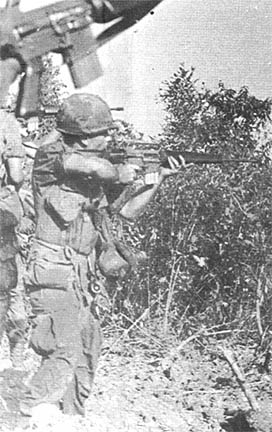 |
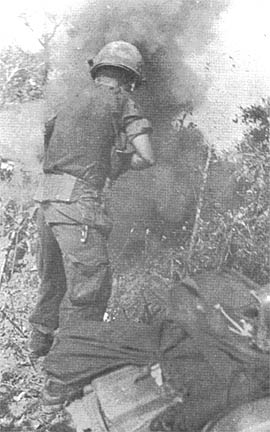 |
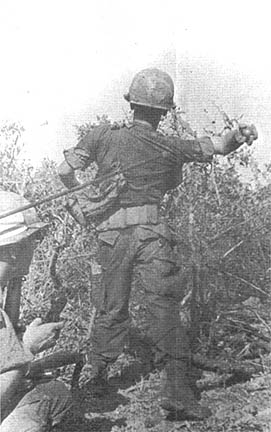 |
| As the enemy weakens, M-16’s do the trick | One more enemy bunker goes up in smoke | A grenade puts the finishing touches on the main stronghold |
| Delta Company heads for home after leaving fifteen enemy dead. |
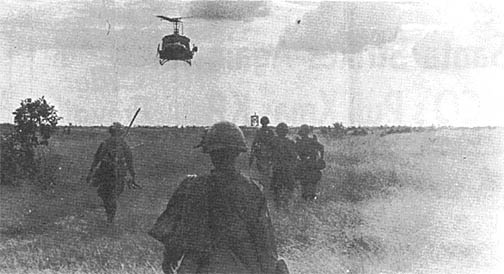 |
 |
Kit Carson Scout checks a diary found in a tunnel |
| Golden Dragons move on a line assault toward enemy stronghold. |
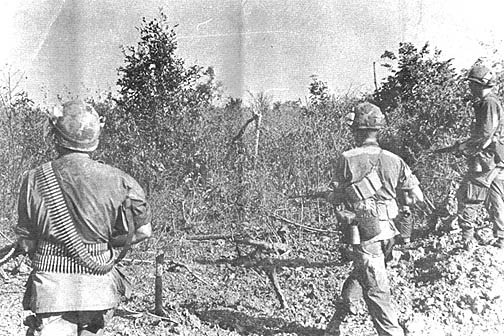 |
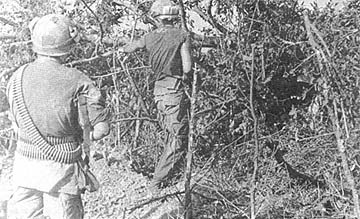 |
A squad leader points to an area he wants checked |
Page 6 TROPIC LIGHTNING NEWS January 12, 1970
Santa Strikes Again
NCO’s Pull Xmas KP
CU CHI – “K.P. is the worst detail there is and I didn’t EVEN want
to pull it on Christmas Day!”
That was Specialist 4 Francis A. Van Allen’s reaction on seeing his
name on the .K. P. duty roster for Company C and HHD of the 125th Signal
Battalion. Van Allen’s exclamation was overheard by SFC Michael F. Janicki
who decided to help him out.
JANICKI GATHERED NINE K.P. volunteers, all E-5’s and above, and let
the troops enjoy a bit of turn-about for the holiday.
The nine included: SFC Donald R. Evans, SSG Fred L. Conkey, SSG
Charles L. Hess Jr., SGT Ronald K. Wilson, SSG William S. Jordon, SGT John W.
Hubbard, SGT Calel G. Arnold, SGT James Roden, and SGT Dennis W. Long. Hess had spent Christmas Eve
as the battalion staff duty NCO.
“SERVING THE MEALS wasn’t half of it”, said Evans. “First it
was peel the potatoes, then it was scrub pots and pans. I almost forgot
what it was like. It was a few years ago, you know.”
Cpt. William G. Nish, company commander of Company C, complimented
the NCOs for the “spontaneity” and “vigor” they displayed.
Lt. Charles A. Salemme, HHD commander, said, “Wasn’t it great?
It really gave the troops a laugh and a lift.”
Specialist 4 Richard Smith, one of the original K.P.’s said, “I
loved seeing all those stripes doing MY thing.”
| Law And Order Prevail CU CHI - There is a rumor going around that a crook is working in the finance office here. “It’s no rumor,” said Lieutenant Colonel Milton Jones, Division Finance Officer, “it’s a fact.” The crook in the office is Major Louis Crook, of McCrory, Ark deputy finance officer for the division. If there is any doubt as to the safety of your finances it can be quelled with the knowledge that there is a sheriff working in the same office. Someone or something in USARV Headquarters has a sense of humor, though it may be unintentional, because they assigned Specialist 4 Alan Sheriff of San Diego, Calif. to be the finance clerk. |
Ask Sgt. Certain
DEAR SARGE: I’ll tell you right now that I have a problem. I’m getting
short and I think I’m losing my mind at the same time. It seems that
little things that I own are disappearing, or at least I think they are
disappearing. This may be a short timer’s plague but I’m sure that I had
two boots and a P-38 when I went to bed last week. Now they’re gone.
I’m a little worried that the shorter I get, the more things are going to come
up missing. Am I going crazy or what?
STOLE N. BLIND
DEAR STOLE: Probably. My files are filled to overflowing with letters such
as yours. I think most short-timers have the same problem as you have just
explained. I simply don’t know what to tell you except to keep an extra
close watch on your gear. I’ll have to cut this short because my eyes are
getting tired. Someone has stolen my glasses.
DEAR SARGE: I’m told that there is a way to make pizza out of C-rations and
other forms of life. It there is a way to make a pizza we sure would like
to know about it. It’s been such a long time that I’ve had a good Italian
dish.
CHET BOYARDEE
DEAR CHET: I don’t know much about Sophia Loren but I’ll tell you how to make
Italian food. Take a water can and cut the top off of it. If you
like you can take the hinge off an ammo box and make a cute little door.
Next squash two beer cans and make a little rack on the bottom of the can.
Get a can of bread from the C-ration pack and work it around in your hands until
it’s gooey (that shouldn’t take long). Spread it out on a cut open coffee
can and spread some beef slices on it. Put some canned heat under the
water can, insert the pizza and light. When you smell it burning, take it
out and serve. Average serving: 1 small GI.
DEAR SARGE: I’m getting so short that I can go swimming in my canteen cup.
The problem I have now is language and manners and how I’m going to react when I
get back to the world. They have undergone a steady decay, and I’m afraid
that I will embarrass some of my friends at a dinner party or something.
Is it hard adjusting? I’d like an answer right away fatso.
BILLY GAHAM
DEAR BILL: I think you should start right away on your new language
beautification program. I don’t think it’s too late. I have a few
hints that might remedy the problem though. Every time you feel a nasty
word coming on, bite down hard on your tongue. This should last a good
fifteen or twenty minutes. Another little hint is to hang around women
starting real soon. This will get you used to talking around members of
the opposite sex. Any hootch girl will do the trick, but if she starts
swearing (which they are prone to do) you will have to leave. Just
remember, a clean mouth is a happy mouth.
Arty Go - No Dough
TAY NINH - Without artillery support, the infantryman would be
seriously handicapped in his attempts to contain the enemy, to say the least.
AFTER THE NECESSARY clearances are granted, artillery places
devastating firepower on enemy positions. However, clearances aren’t that
easily granted and at Fire Support Base Rawlins, Headquarters for the 4th
Battalion (Mechanized) 23d Infantry Tomahawks, there is an additional clearance
the 155s must receive before they fire.
It seems that the mess steward; Specialist 6 Joseph Biggers of
Columbus, Ga. has quite a problem with his cakes and pies when the big guns
roar.
“I THOUGHT THE 105s were bad but now we have 155s and it’s nearly
impossible to get any baking done,” complained Biggers.
After consulting with the Battalion Commander, Lieutenant Colonel
James Coggins of Decatur, Ga., and the artillery chief about his problem, it was
agreed that any unnecessary firing would be halted. Also, if possible,
Biggers and his mess personnel would be notified before the firing to try and
compensate for the blasts from the 155s.
Now everyone is content, as the cannoneers continue to provide
excellent support for the Tomahawk troopers and Specialist Joseph Biggers turns
out the finest baked goods this side of Nui Ba Den.
Flashing ‘Eyes’ Big Hit For Wolfhounds
CU CHI - ”Oh what big, shining eyes you Wolfhounds have,” exclaim
the little Red crawling hoods who roam the 3d Brigade area of operation by
night.
The shining ‘eyes’ they’re refering to are strobe lights - the same
type you’ve seen in discotheques back in the world - now being carried by all
rifle companies of the 1/27th and 2/27 Wolfhounds.
The strobes which emit a sharp burst of light every second are used
to identify troop locations by night or to mark distress areas where supplies or
a MEDEVAC might be needed.
“The beauty of these lights is a platoon leader can put the strobe
inside an upside down steel pot and beam light straight up to a chopper overhead
without giving away his ground position to any nearby VC or NVA,” said brigade
S-4 Major Graham Norris, Jr. of Gaffney, S.C.
Pilots like the strobes too. “They’re just great,” said 3d
Brigade aviator Warrant Officer Skip Fisk of Covington, Ky. “I’ve picked
them up at better than 3,500 feet.”
Page 7 TROPIC LIGHTNING NEWS January 12, 1970
| NAP TIME - SP4 David Rozga of Grand Rapids, Mich. relaxes atop his bunker on the perimeter line. These short naps make up for lost sleep on night operations. The chair doesn’t look too comfortable but it gets the job done. |  |
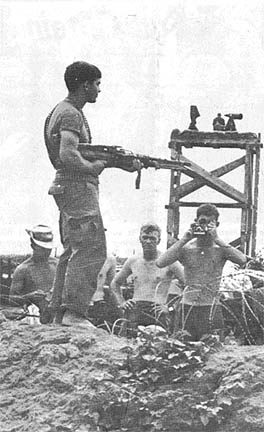 |
LOOK OUT JOHN WAYNE - A few moments of picture taking can provide a few laughs and also memories in future years. |
What, No work Today?
Day Off - A Busman’s Holiday
PHOTOS AND STORY BY SP4 FRANK DITTO
CU CHI - While working out of a remote patrol base, like the 2d Battalion,
14th Infantry’s PB Hunsley, the infantry company seldom gets a break from the
hard life inflicted upon it by the environment.
One opportunity for a little rest is presented a line company when it is
given the task of securing the patrol base during the day.
Under normal operations, one platoon is left back to guard the base and take
a break from constant field operations. For the men of the company, this day
break is considered a day off. Even though numerous details are constantly
arising. this day away from the grind offers a chance to catch a short nap,
clean a weapon, write that long overdue letter home.
The danger-filled life of an infantryman offers few chances for enjoyment.
Perhaps this is the reason hard working, hard fighting men find such great
pleasure in some of the more simple forms of recreation.
| MAN’S BEST FRIEND - In Vietnam is his M-16. And keeping it clean is a life-saving effort. |
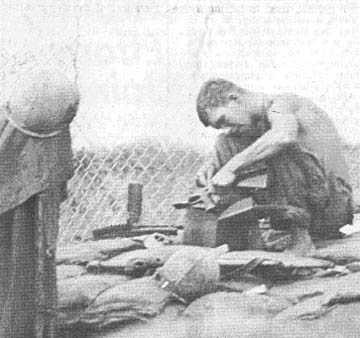 |
 |
HOT RICE adds that little something extra to make a noon meal of C-rations a bit more special. On day operations the hot meal at noon is not possible because of the time schedule. |
 |
| POLICE CALL - The infantry platoon that mans the patrol base during the day is constantly on call for extra duty. Here the men of Delta Company 3d Platoon place sandbags from the wire at the helipad outside the main gate at Patrol Base Hunsley. |
Page 8 TROPIC LIGHTNING NEWS January 12, 1970
 |
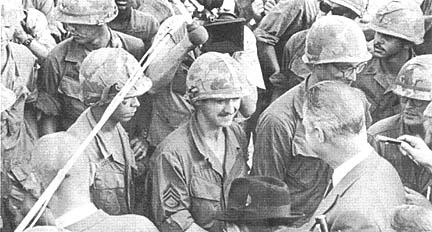 |
| CHANCE OF A LIFETIME - Troopers from the 2d Battalion, 14th Infantry meet Vice President Spiro Agnew. The Vice President visited Fire Support Base Patton while on an Asian tour. (Photo by SP4 Joe Loper) |
A DISTINGUISHED VISITOR - Vice President Spiro T. Agnew is surrounded by men
of the
2d Battalion, 14th Infantry and 3d Battalion, 13th Artillery during his visit to
Fire Support Base Patton recently. The Vice President met and talked with the men for over an hour. (Photo by SP4 Joe Loper) |
Communication Is the Word
Tay Ninh-Part Of The Nationwide Bell System
By SP5 DAN DE LANEY
TAY NINH - Telephone calls can be fun, or they can be frustrating
when you ask for the mess hall and get the Red Cross instead. But, of an
average eight to 10 thousand calls per day plugged in by the five operators on
duty at Tay Ninh base camp, only about one percent get misrouted.
If there is a mistake, it will be corrected quickly, courtesy of
587th Signal Company signalmen.
Service is the motto of the 240-man company, one of the largest
service companies in Vietnam.
THEY PROVIDE communications services for Tay base camp, Dau Tieng,
base camp and Tay Ninh city. Long distance voice and teletype circuits
provide UHF service for all subscribers, direct to Cu Chi, Dau Tieng, and
through relay stations to Bien Hoa, Saigon and every other place in country and
out.
With none of the attendant comforts, the job of providing telephone
service here equals the way it is in a city of about 50,000 people back home.
Facility units are named and staffed the same as Bell Telephone and Western
Union companies are in the world.
Maintenance of existing lines is a full-time job, as is the putting
in and taking out of telephones, plus taking care of more than 20 miles of cable
and telephone lines.
First Lieutenant Charles T. Shaffer heads Cable Section and Red
Platoon. Cable section provides general support to the entire company,
fixing cable when it’s broken, rolling it out and burying it when it’s new.
They also string telephone lines in the air, telephones and rearrange existing
lines, to serve subscribers’ needs.
RED PLATOON TAKES care of Tay Ninh base camp, which has a typical
switchboard of nine lines servicing about 400 subscribers, operated by five
operators working 12 hours shifts seven days a week.
Operators are rotated so they get a day off after six days’ work,
and while working they get a ten minute break after 50 minutes of work.
Red platoon also operates an area commo center/teletype unit with
four systems processing more than 2,000 messages-by-wire per month.
White Platoon, led by First Lieutenant Robert Diedrich, has the job
of servicing the Dau Tieng base camp area, tying in with lines throughout the
country and providing teletype relay service through Tay Ninh worldwide.
BLUE PLATOON, LED by First Lieutenant John Macomber, works in Tay
Ninh city running the Military Telephone System there.
The four platoons, Cable, Red, White and Blue, make up the
whole signal company. Recently they dug trenches five feet deep by one
foot wide for ten miles, using shovels, to install a new underground cable
system for more reliable communications on Tay Ninh base camp.
To make more trenches in the future, for additional cables to other
places, the unit got hold of a trench digger capable of digging 1,500 feet of
trench a day. That will speed things up a little, as by hand they averaged
about 1,500 feet a week.
The new system is static free, and less of a maintenance problem,
with less breakages and wear from hanging overhead on poles. Underground
it is nice and snug.
 |
 |
| A NIGHT AND DAY DIFFERENCE - Two views of the 2d Battalion, 12th Infantry Warriors Fire Support Base Pershing’ with the top picture showing the bright light of day. The bottom picture shows the same scene with a slight change, the presence of flares, gunships, rifle and machine gun fire, making it difficult for the enemy to move around without being detected. (Photos by SP4 Jeff Hinman) |
Artillery Efforts Joined
By SSG JACK ANDERSON
CU CHI - Dong Tien. Forward together.
That’s the slogan of a new program designed to put both American
and Vietnamese artillery into maximum effective use in Hau Nghia Province.
“Right now, the 3d Brigade has enough arty to cover all of the
province. So do the Vietnamese,” said Captain Joseph Kilbane, Boston,
assistant operations officer for 2d Battalion, 77th Artillery.
“WE WANT TO coordinate all of this fire power so we can derive the
most benefit from it. That’s one part of the Dong Tien Plan,” he said.
Another phase of the plan is the coordination of defensive
artillery concepts.
“Each fire support base, patrol base and Vietnamese outpost has its
own plan for artillery defense of its perimeter. We want a mutual exchange
of targets so that each area is covered, but not duplicated, with available
tubes,” Kilbane said.
ONE OF THE REASONS for the coordination effort, according to Kilbane, is to work up firing data in advance so artillerymen won’t lose
valuable time in computing information before a fire mission.
“We want to be able to just set up and shoot at pre-planned
targets. This requires both American and Vietnamese arty units to trade
information concerning firing data,” he said.
The Dong Tien Plan is a mutual development plan - both allies are
benefiting.
“We’re preparing for the Vietnamese to someday take over complete
arty responsibility for the province,” Kilbane said.
Thanks to:
Karl Karlgaard, 2nd Bn., 27th Inf., and a Tropic Lightning News correspondent,
for sharing this issue,
Kirk Ramsey, 2nd Bn., 14th Inf. for creating this page.
This page last modified 02-21-2005
©2005 25th Infantry Division Association. All rights reserved.